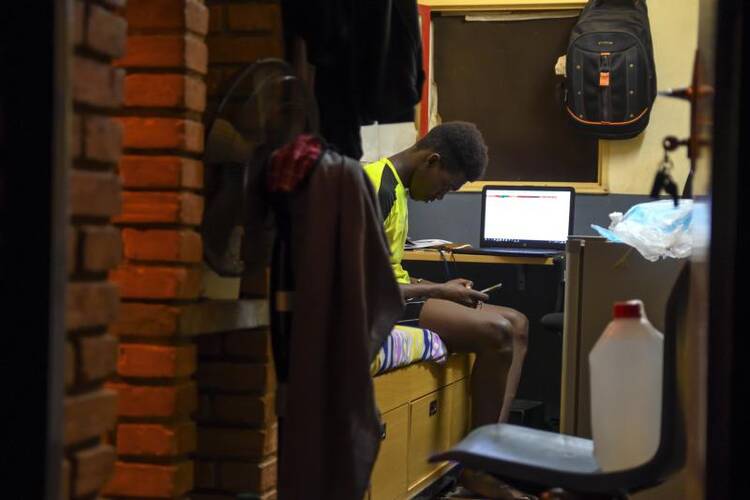OXFORD, England (CNS) -- In African countries already plagued by instability, church leaders expressed concern about increased insecurity.
Catholic clergy in Africa's northern Sahel region have warned that Islamist insurgents could intensify attacks during the COVID-19 pandemic while police and troops are diverted to civil order duties.
Across the continent, Archbishop Giorgio Bertin, apostolic administrator of Somalia, warned that political instability and constant insecurity will make the COVID-19 fight in the country a very difficult mission.
Father Constantin Sere, secretary-general of the Catholic aid agency Caritas in Burkina Faso, told Catholic News Service many communities in the country "lack the means to protect themselves against the coronavirus, and we're operating as widely as we can, raising awareness and supporting the most endangered.
"But the terrorists are still active, and with the security forces deployed enforcing curfews across the affected territories, there's a danger fewer soldiers will be at the front to combat them."
In April, attacks by multiple armed groups, some claiming links with al-Qaida and Islamic State militants, continued attacks in Burkina Faso, Mali and Niger.
Father Sere said violence was worst in central and northern areas of the landlocked country, adding that the arrival of COVID-19 had "created a situation favoring the terrorists." He said thousands of families had been prevented from cultivating their fields because of terrorist violence.
"There's a curfew in the population centers, and this may impede the terrorists, especially at night, but huge numbers will still face hunger after the current rainy season because of the terrorist offensive," the priest said.
"There are so many insurgent factions, all pursuing their own objectives with no single command structure or united set of ideas. Despite the pandemic, they look set to remain active."
In neighboring Mali, Msgr. Edmond Dembele, secretary-general of Mali's Union of Priests, told Catholic News Service the church feared deteriorating security.
"It was hoped this pandemic might calm the situation, since the armed groups would also be vulnerable, but the attacks and abductions are causing alarm," he said.
"This isn't an interreligious conflict, and Christians aren't being specially targeted. But like all Malians, they're highly exposed to the terrorist menace."
Security has deteriorated in the largely arid Sahel region, with more than 4,000 killings in 2019, according to a Feb. 21 statement by the U.N. High Commissioner for Refugees.
In a March 20 report, the World Food Program said 861,000 people were currently displaced in the three countries, with 3.7 million facing food insecurity.
However, news reports said two dozen soldiers and insurgents were killed in Burkina Faso in four separate early April attacks, despite the presence of 5,100 French troops.
In an April 12 statement, the Mali government confirmed increased attacks. And in Niger, where 67 soldiers and attackers died in a battle April 2, a priest with the Society of African Missions told the Vatican's Fides news agency that papal and U.N. appeals for a worldwide cease-fire during the coronavirus pandemic had passed "almost completely unheard."
"Jihadist terrorism continues to bloody this land and claim hundreds of victims," Father Mauro Armanino told Fides April 18. "There's deep concern about possible contagion outbreaks in areas where armed clashes are taking place. ... The whole population, already exhausted by misery and disease, is calling for peace."
In an Easter message, Burkina Faso Cardinal Philippe Ouedraogo, who is currently convalescing after being hospitalized with COVID-19, appealed for "local, regional and international solidarity" to save lives during the pandemic, but also urged "reconciliation, justice and peace," and an end to "killings perpetrated by evil forces."
Michael Stulman of the U.S. bishops' Catholic Relief Services, confirmed economic dislocations and escalating prices had made vulnerable populations "more in need of assistance than ever," as access to clean water, hygiene supplies and health services came under strain.
"Families were already struggling with the impact of violence and food insecurity before COVID-19. Now they're dealing with yet another blow to their livelihoods," he said.
CRS is part of the international Caritas network and, in Somalia, Archbishop Bertin said Caritas was prepared to support medical institutions to help tackle the epidemic in the Horn of Africa country.
"The government institutions should try their best to take measures at least in the areas they control and of course block the roads going into the rural areas controlled by al-Shabab," the al-Qaida affiliate in East Africa, Archbishop Bertin told Catholic News Service.
The militant group has been telling people COVID-19 is being spread by "foreign forces which have invaded the country and the disbelieving countries (European Union, U.K. and USA) that support them."
According to analysts, lockdowns and curfews may not be practical in Somalia due to the absence of an effective government. A 30-year conflict has confined thousands of displaced people in camps with no access to water, soap and no distance to keep.










